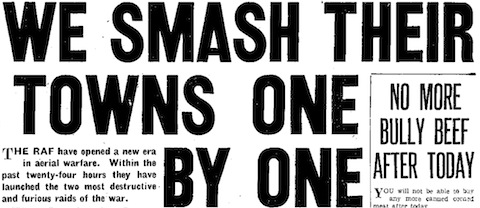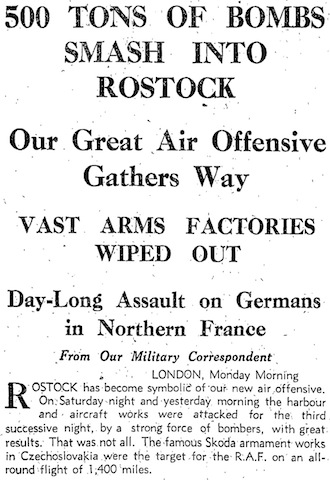Most newspapers today lead with the story of a successful Commando raid on the French coast near Boulogne early yesterday morning — though only the Daily Mirror (above), rather bizarrely, focuses on the fact that ‘All wore gym shoes’ (1) (apart from the ex-Limehouse police inspector who wore slippers). More colour is provided by the dashing Lord Lovat who led the raid wearing ‘the bonnet of his own Lovat Scouts, a body of Highland deerstalkers […] whose training is ideal for Commando work’. The purpose of the raid is not clear — the official communique only says it was a reconnaissance mission — so it’s hard to say if it achieved its objective. Perhaps the aim was to tie up German cement supplies:
SO greatly do the Germans fear Commando raids and invasion that they have earmarked more than half the French production of cement — about one and a quarter million tons a year — for use on new defence works along the coast.
But in purely operational terms the raid seems to have been a success (8):
Remarkable from the military point of view was that, after spending two hours on enemy-occupied territory, every man was withdrawn with arms. Our casualties were negligible.
The Navy, which delivered and retrieved the Commandos, also got away largely unscathed, and damaged two armed German trawlers in the process.
There is plenty of other war news, of course, but nothing nearly so spectacular. The Times actually leads with the announcement in Delhi by Colonel Louis Johnson, President Roosevelt’s personal representative, that ‘United States troops are already in India and that more will be coming’ (4). Reading more closely, however, these ‘troops’ appear to be only a ‘technical mission’, the functions of which are
to collect data, to make industrial explorations, to furnish technical experts if wanted, and to make recommendations to President Roosevelt, and to assist in applying these recommendations in India to the extent that Indian industries desired.
Johnson didn’t disparage Indian production but did say that it was still on a peacetime footing. Since British forces are still retreating in Burma — today it is announced that they have ‘completed their withdrawal across the river Pinchaung, “not without some loss of personnel and equipment”‘ — that will obviously have to change.
The Russian front is largely quiescent, the Times reports, as ‘operations have been brought to a standstill by the vast mudfield, which, like so many things in Russia, is easily the largest in the world’. Germany is however still attacking on the Leningrad front,
where the [German] soldiers in some parts are obliged to stand in flooded trenches with water up to their hips, and where during the nights their coats freeze into a sort of ice armour as the soldiers frequently sink into the water breast-high. It is obvious from such descriptions that little progress is possible at present even along the railways, as troops and arms crowd to them.
The main activity is in the north, where a Russian offensive against the Finns is reportedly ‘continuous and heavy’ and in the south, where it is thought that the 22nd Panzer Division has been redeployed from France to the Crimea.
Much further south (and east), in New Guinea, it’s a lot warmer. The Times relays a report from Allied headquarters in Melbourne that a Japanese air raid on Port Moresby, the twenty-sixth so far, was carried out by ‘eight enemy bombers with a fighter escort on Tuesday morning’:
Our fighters ‘intercepted the enemy brilliantly,’ and destroy four ‘0’ type aircraft. We had no losses. Our air force attacked wharves and buildings at Rabaul on Tuesday, starting numerous fires.
A recent article in the Times on the growing closeness between Australia and the United States seems to have provoked some reaction in Australia — well, at least from the Times‘s Canberra correspondent, who asserts that this is ‘dictated primarily by the facts of world geography […] Australia is America’s obvious base for an ultimate counter-offensive’ against Japan (3). The correspondent seeks to reassure British readers that Australians still retain ‘ties of sentiment and culture with the Mother Country’, as well as ‘an economic bond’, but pleads for Britain to do more to cultivate the relationship:
The United Kingdom has a tremendous stake in this country, not the least important in which is the affection and gratitude of millions of the best Australians. Every day there is more and more evidence of the wisdom of doing something to protect it if only it be by keeping Australians supplied with facts which would enable them to get a balanced picture of the world scene. A word in season now and then from people in high places addresses directly to Australia is greatly needed. The job should not be left exclusively to Australians who realize this need.
A number of newspapers today carry a story presenting an overview of the bomber war — no doubt derived from the same Air Ministry briefing. The one in the Yorkshire Post opens by noting that in the period 20 March to 20 April (it actually says 30 April, which still is in the future, but the Manchester Guardian says 20 April), ‘under 200 enemy aircraft crossed the coasts of Great Britain by night, and the tonnage of the bombs dropped was nearer 250 than 300’ (3).
In the same period we dropped on Germany in one week more than 1,000 tons of bombs, and there were at least six nights on each of which the tonnage dropped there exceeded the Luftwaffe’s ‘British’ total for the month.
Bomber Command has ‘suffered some regrettable losses in our European attacks this year’, but ‘our wastage is not unduly heavy when the scale of recent attacks in taken into account’. Indeed, during the same period ‘the Axis’ lost more aircraft in its attacks on Malta than the RAF lost in its attacks on Germany, 140 to 112. It is suggested that the the efforts of the ‘New British Broadcasting Station’ (which pretends to be a British radio station but is actually German black propaganda) to deny the damage done to Germany (as well as in the recent American raid on Tokyo) rather suggests the opposite:
‘We should know better than anyone,’ said the station after the attack on Tokyo, ‘that the bombardment of towns cannot bring the end of the war nearer. London withstood about as heavy a bombardment which could be launched, something compared with the raid on Tokyo cannot have been more than a pinprick.
‘The proper use of aircraft is to support land forces in the actual battle zone, and as the R.A.F. is not large enough to fulfil all its tasks, it should be reserved for this purpose only. A daylight raid on Augsburg, for instance, may be spectacular but its practical value is negligible.’
While the Post allows that it can’t be assumed that Germany ‘could not concentrate a fairly heavy attack on some British target’,
There is no evidence, however, that the Luftwaffe is being strengthened at present on the Western Front, and sensational stories which have gained currency concerning big reinforcements of air-borne troops and so forth are known to not have any basis of truth.
On that note, the Guardian reports (5) that
Nazi raiders dropped bombs last night near a town in South-west England. They fell in open country and there are no reports of casualties or damage.
![]() This work is licensed under a Creative Commons Attribution-NonCommercial-NoDerivatives 4.0 International License.
Permissions beyond the scope of this license may be available at http://airminded.org/copyright/.
This work is licensed under a Creative Commons Attribution-NonCommercial-NoDerivatives 4.0 International License.
Permissions beyond the scope of this license may be available at http://airminded.org/copyright/.







It’s spring in the northern hemisphere, and, I would argue, the start of the most important campaigning season in human history. As Brett posts, I’ll hopefully have an opportunity to point out why. It’s not just politics. It’s that war’s agonism is transforming everyday life.
But I never imagined that we’d start with rubber-soled shoes.
Pingback: Airminded · Friday, 24 April 1942
Well, you’d better hurry up, I’m only doing this for a couple of weeks! :)
Pingback: Airminded · Post-blogging the Baedeker Blitz: conclusion